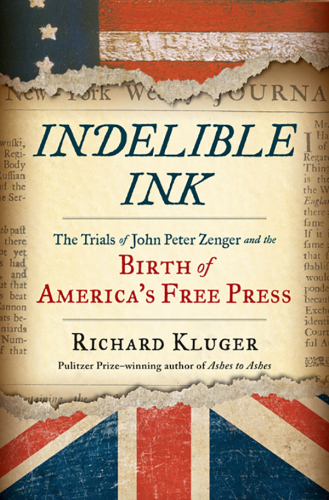
Indelible Ink
The Trials of John Peter Zenger and the Birth of America's Free Press
کتاب های مرتبط
- اطلاعات
- نقد و بررسی
- دیدگاه کاربران
نقد و بررسی

Starred review from July 11, 2016
Kluger, the Pulitzer Prize–winning author of Ashes to Ashes, celebrates the power of free expression in his book on John Peter Zenger’s pioneering colonial newspaper, the New York Weekly Journal. Contextualizing the pre-revolutionary situation in which Zenger launched his paper, Kluger accurately describes the relentless royal prosecution of anyone printing anything without a license, which opened violators to charges of “seditious libel” in disturbing the peace and subversion. In 1710, Zenger became an apprentice to printer William Bradford, but Bradford was soon tried for libel, surviving when his suit was dismissed on a technicality. Zenger returned to Bradford’s employ in 1725 before going on to produce his own four-page paper. In 1733, amid a messy, politicized environment of accusations, scandal, and power shifts, Zenger himself was charged with libel for revealing the aggressive, dominating policies of the British officials. He was jailed for nine months before his historic one-day trial. Framing his work with F.D.R.’s monumental 1941 “Four Freedoms” speech, Kluger produces a comprehensive tribute to Zenger’s legal battle against censorship and reprisal, which sparked progressive thought later appearing in the basic political documents of the young American republic.

June 15, 2016
A Pulitzer Prize-winning historian looks back at the 1730s, when a single court case established the first step toward freedom of the press.Kluger (The Bitter Waters of Medicine Creek: A Tragic Clash Between White and Native America, 2011, etc.) presents the story of John Peter Zenger (1697-1746). After apprenticing to William Bradford, the appointed royal printer, and serving as his journeyman, Zenger set up his own printing company. It was not as easy as it sounds, and he had considerable backing. This is also the story of the wealthy Lewis Morris. It was the legal engagement required to secure his inheritance that set him on his quest for lifelong learning and power. Eventually becoming one of the strongest politicians in the New York area, he was the senior member of the New Jersey Provincial Council. Kluger also tells the tale of the royally appointed governor serving New York and, after Morris' successful petition, New Jersey. Historically, governors sent to the Colonies were strong on connections but short on capital. As such, there were many instances of self-serving governors, and Morris' role in the recall of two of those illustrates how strong his powers were--that is, until William Cosby took over. He immediately took sides against Morris' faction, siding with the trade barons against him. Here, Zenger met the needs of Morris and his brilliant cohorts. They hired Zenger to publish the New-York Weekly Journal to be an irritant to the governor. Wise to the draconian libel laws, they carefully avoided any illegal steps. Kluger takes some time to get to the meat of the story, but the attempts to indict Zenger and the eventual trial are enlightening and frightening--frightening to see how easily the press could be quashed and enlightening to see how that freedom was secured. A book of American history for all, but lawyers and journalists will especially appreciate it.
COPYRIGHT(2016) Kirkus Reviews, ALL RIGHTS RESERVED.

Starred review from June 15, 2016
We wouldn't remember John Peter Zenger (1697-1746) for his momentous contribution to freedom of the American press if not for Lewis Morris (1671-1746). A brilliant, self-serving, power-hungry landowner, Morris was driven to avenge his firing as New York chief justice by William Cosby, royal governor of New York. Pulitzer Prize-winning author Kluger (Ashes to Ashes) deftly details the years of repressive political and legal conditions leading to Zenger's 1735 trial for printing Morris's and James Alexander's anonymous, cutting accusations of the governor in a newspaper designed solely to ruin Cosby's reputation. Kluger thoroughly outlines the history of Cosby's peremptory abuse of royal prerogative, and the conniving of Morris, Alexander, and other antiroyalists. Andrew Hamilton, Zenger's skilled attorney, boldly and successfully challenged prevailing law that defined any criticism of the royal government as criminal seditious libel. Kluger raises important questions still resonating today: Should the government limit free expression to maintain order and shield itself from criticism (warranted or not)? How far should judgment extend if it spurs unrest or threatens national security? VERDICT This thought-provoking account deserves to be read by everyone; it will especially appeal to readers interested in law and colonial history.--Margaret Kappanadze, Elmira Coll. Lib., NY
Copyright 2016 Library Journal, LLC Used with permission.

Starred review from August 1, 2016
When computer maven Edward Snowden shocked the nation in 2013 by leaking details of the NSA's monitoring of ordinary Americans' cell phone calls, those debating the legality of his whistle-blowing frequently invoked recent parallels, such as Daniel Ellsberg's 1971 release to the New York Times of the Pentagon papers and Bradley Manning's 2010 WikiLeaks disclosure of secret military cables. Kluger recognizes a need to assess such exposes in a much broader historical context, which he opens to readers by visiting the early eighteenth-century world where the maverick printer John Peter Zenger first established freedom of the press as a fundamental principle of the American founding. In that simpler but hardly less tempestuous age, Zenger made daring journalism a new political force, bringing to light in his New-York Weekly Journal the misdeeds of the royally appointed governor, William Cosby, who furtively manipulated the judiciary, suppressed voters' rights, and enriched himself with shady land deals. Event by compelling event, readers follow Zenger through the drama that eventually landed him in jail on libel chargesbefore a liberty-loving jury freed him with a 1735 verdict signaling a clear American commitment to the unfettered reporting that can check abuse of power. The much-needed prologue to today's headlines.(Reprinted with permission of Booklist, copyright 2016, American Library Association.)

























دیدگاه کاربران